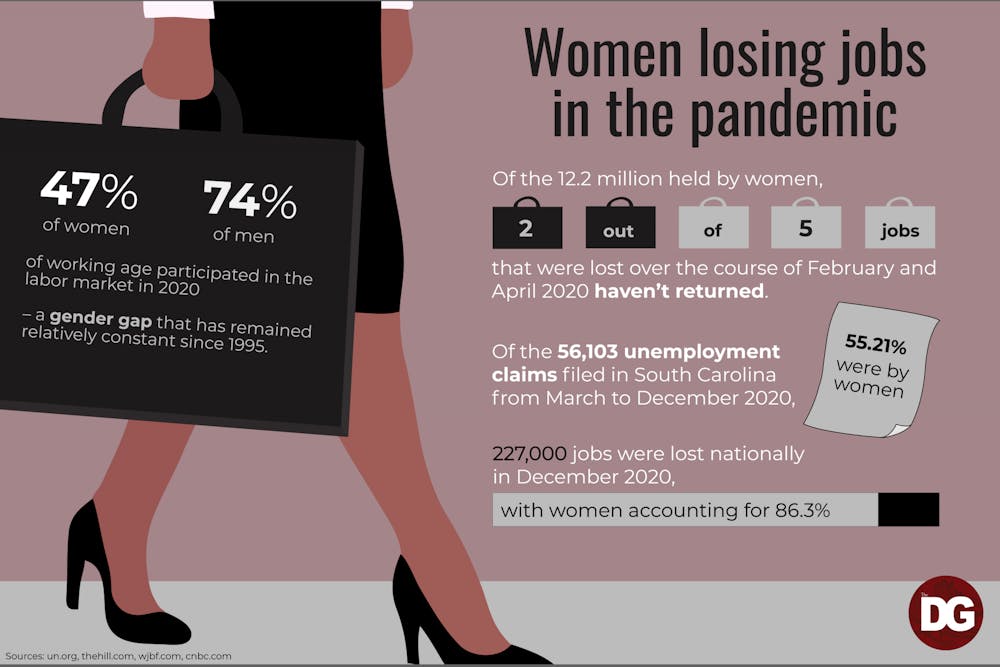The women’s unemployment crisis is an issue that everyone, not just economists, need to educate themselves on.
For many working women, the pandemic became real when they lost their jobs.
More than 2.3 million women have left the labor force since February 2020, putting women's workforce participation rate at the lowest it's been since 1988.
Particularly, the highest unemployment rate during the pandemic was for Hispanic women at 20.2%. For Black women, the unemployment rate was 16.4%.
“This pandemic has been mostly affecting the service jobs and they tend to be occupied mostly by women," Orgul Ozturk, associate professor of economics at the Darla Moore School of Business, said.
Some have defined this phenomenon as a "shecession." Because of COVID-19 related lockdowns and the closure of retail sectors, women have mostly carried the consequences of the economic crisis, as they are overrepresented in services sectors.
The recession has also affected working women that had to stay at home. According to Ozturk, “as a working woman, you rely a lot on services that are provided by the market" such as food service, childcare and house-cleaning services.
On an average day, women worldwide spend about three times as many hours on unpaid domestic and care work as men do.
Ozturk said "it’s still seen as women’s job to take care of kids and elderly," but during the pandemic, women don't have the childcare they need to be able to perform in their jobs.
Furthermore, women are more likely to work multiple jobs than men.
For Tammy Griffin, owner of Kiss My Grits Café, having more than one job gave her financial stability during this period.
“We shut down for about three months during that initial quarantine period," Griffin said. "So it was a downside, but this is not my full time job, so financially, I was okay.”
Having a second job should definitely be a choice, such as in Griffin’s case, and not a need. We need to be an advocate to make institutions accountable for the support of working women.
In addition, women have been losing childcare benefits or carrying the burden of domestic tasks while working on remote full-time jobs.
Particularly in South Carolina, the supply of childcare is considered low, according to Ozturk. This affects the final price, deeming this benefit not worth it for men nor women.
Paid maternity leave has been an issue even before the pandemic revealed the broken system. In the United States, there isn't paid maternity leave, which Ozturk called "a very rare situation for a developed country."
Another variable to consider is post-pandemic career development, increasing an already existing gap.
“Women are put to a more higher standard when promotions are at stake," Ozturk said.
The wage gap also deepens this crisis.
“The effect has been immediate, and people were in jobs where there was really little — they were already earning, I think, very little," Ozturk said.
An organic workplace policy that increases female worker's representation would be better than an imposed requirement for employers, according to Ozturk.
“They are not there because some quota is forcing there to be," Ozturk said.
This discussion goes beyond experts in economics and employment policies. The data reflects parts of a system that needs to be fixed by society in general. If we become aware of our social responsibility within our communities, there is hope.
Bethany Culclasure, who works in Five Points at the iconic Papa Jazz Record store owned by Tim Smith, said it was the people that helped them.
“Luckily people were more than happy to support us and just keep us afloat, so it was really like a community effort," Culcalsure said.
We need an imminent return of women to the workplace, and we all have a role to play, no matter if we are on the consumer, company or the government side.
By helping our closest local stores, demanding changes in parenting leaves policies or prioritizing women-owned business, we will make sure we are not ignoring an important crisis.

